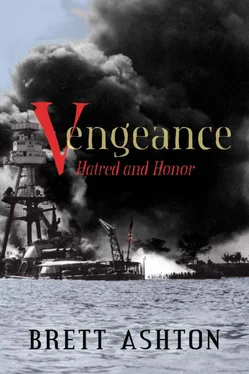I had been so busy with the war that taking pictures to send home was rare and he was only a month old when I had sent them home to Ohio. I knew about things like June and Robert being in school and getting good grades from letters that Susan sent me, but other than that, who were my children really becoming? And when would I finally get to see them again?
As I was finishing polishing the handgrips, the chief from the machinist crew came in and greeted me.
“Captain, how are you tonight? Working on the Colt again?”
Chief Jackson was on the Buffalo ’s shooting team, which was urged on by me, even though the responsibilities of my rank no longer allowed me to participate. He was a good enough shot who really knew his way around the mechanics of the sport. He was also from the South and had somewhat of an accent to back it up. The crew called him “Stonewall,” supposedly because he was a direct descendent of the legendary Civil War general.
“Yes,” I replied. “I visited my old ship, the Oklahoma , earlier today and managed to retrieve my old sidearm.”
“Really? Does it still work?”
“Not a chance,” I said, handing the rusted old Colt over to him to look at, “but I think the handgrips have cleaned up nicely.” As we continued talking, I unloaded my new forty-five and began to remove the stock wooden grips and replace them with the pearl ones.
The chief whistled and said, “It sure looks like it was a nice one. It’s a shame. Are those grips pearl?”
“Yes. I’m putting them on my new gun.”
“It’s too bad about the rest of this old one,” he said, laying it on the workbench next to us.
“Well, it’s in better shape than the ship I got it off of earlier today, or her crew for that matter. And I’m wondering about the former assistant gunnery officer.”
“You were on board during the attack, sir?”
“Yes, I was.”
“Bad, was it?”
“Yes.”
After an awkward pause, he said, “Don’t worry, captain; I’m sure we’ll get the Japs back plenty enough by the end of this war.”
“At this point in the war, I’m sure we will, Stonewall, but will it be worth it?”
“This war is necessary, sir. What do you mean?” he said, with a cross between protest and surprise in his voice that was unusual for an enlisted man to use on his commanding officer.
“I’m sure it is necessary for the United States, chief. And I’m sure for some reason, which we have yet to understand, when they attacked us, the Japs thought so as well. But I wonder, for the sake of all of us on both sides, if it’s worth it.
“I have a wife and three kids, and one is a son who is three who I haven’t seen since he was a month old. Sure, it looks like we are winning the war right now, but it could still drag on for many more months, and a lot of men, even some more that we know, or even us for that matter, may never see our families again.”
“To defend the freedom of those who are left, I suppose, it is worth it, captain,” he said.
“Yes, I suppose you’re right, Stonewall,” and as I slid my new Colt into my shoulder holster with its replaced grips, I said, “but there are some things from the past that are valuable that we need to hold on to. And maybe it’s just that I’m tired of being on ships that keep getting hit by torpedoes, but I also wonder if maybe we are still carrying some things that we should let go of.” I picked up the rusty Colt forty-five the chief had laid on the workbench and dropped it in the trash can.
“It’s been a pleasure talking to you tonight, chief.”
“And you too, sir,” he said as I left the room.
As a crew, we tried our best to keep up with what was going on in the war, but healing the Buffalo ’s wounds was a full-time task, and being out of action prevented us from being in a position of “needing to know.” Most of our information came in the form of the typical officially approved news reports and press releases.
News of the continuing Kamikaze attacks and the progress of the Okinawa invasion dominated the news until that battle was eventually won. The fate of the feared battleship Yamato was greatly celebrated when the news made it back to us.
There was a lot of traffic through the harbor as the United States made preparations for the inevitable invasion of mainland Japan. Or so we thought. But as you know, that never came to pass.
By late July of ’45 we had been out of drydock for several weeks and were heavily involved in post-repair shakedowns and training. A lot of the crew had been replaced and was being brought up to speed. The order came for us to deploy to the Okinawa area and join the fleet in preparations to support the invasion of the Japanese mainland.
While in route, the news came in about the atomic bombs being dropped on Hiroshima and Nagasaki and the impending Japanese surrender. During the time after the announcement and before the formal surrender, we were told to be on the lookout for renegade Japs who did not wish to surrender. Orders came in from Admiral Halsey that because of the sensitive nature of the surrender, and newly found peace between our nations, if we came upon any Japs not laying down their arms, to “kill them in a friendly fashion.” This was for political reasons, I guess.
It was a few days after the dropping of the atomic bomb on Nagasaki when I received the orders to proceed to a latitude and longitude that was somewhere to the southeast of Okinawa, to “find, rescue, and accept surrender from” a Jap submarine.
The Buffalo and the destroyer assigned to escort us found them right where they were supposed to be. I checked my forty-five, just to be sure. This smelled of a time that I might have to use it.
With extreme caution (to make sure this wasn’t some kind of ambush by a renegade sub captain), we approached them without incident. No sign of ships other than ours, no sonar contacts, and even better, no torpedo wakes.
As we came around to tie up next to them I turned to Major Johnson and addressed him. Right at this time, most of his unit was placed at strategic points all over the port side of the Buffalo , armed with as many thirty- and fifty-caliber automatic weapons as they could hold. And several of the twenty-millimeter guns were trained on the sub as well.
“Yes, sir?” The major asked.
“You know the Jap customs?” I asked.
“Yes, sir.”
“I want this to be perfectly clear, if just one of those Jap bastards even blinks wrong, I want you to cut that ship to ribbons. Do you understand?”
“Yes, sir,” he said without hesitation or emotion of any kind that I could detect.
I looked over my shoulder for the destroyer that was escorting us. It was right where it belonged.
At least the sea was calm that day, not that it would do us any good, but maybe we could see any torpedo wakes in time to take some action.
The order to lower the liberty ladder to the deck of the Japanese submarine was given. Her crew was still immobile and resolute on her deck. I could see the expressions on their faces from my place on the bridge and could tell they obviously were not taking the circumstances lightly.
The major’s crew was crossing the liberty ladder to the Japanese sub. As expected, they executed their task with the brave professionalism and due diligence I had come to expect from the corps.
From my vantage point, I could see the major take several marines below, providing each other cover while numerous other marines stayed above deck guarding the sub’s crew. It would take awhile for the major to secure the sub and make sure it wasn’t somehow rigged.
The major gave no signals indicating a trap. Meanwhile, most of the sub’s crew was still in their place, at attention, on the deck of their ship. Several Japanese officers had been asked by the major to go below decks with him.
Читать дальше












